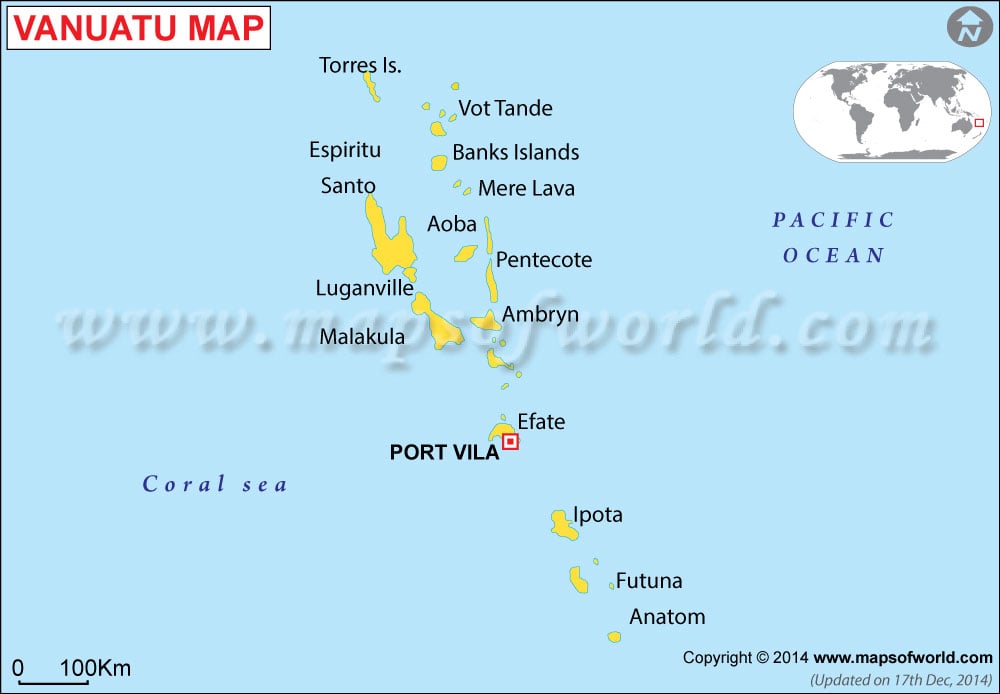Vanuatu Map

- Continent And Regions - Oceania Map
- Other Vanuatu Maps - Where is Vanuatu, Vanuatu Blank Map, Vanuatu Flag
About Vanuatu
Explore this Vanuatu map to learn everything you want to know about this country. Learn about Vanuatu location on the world map, official symbol, flag, geography, climate, postal/area/zip codes, time zones, etc. Check out Vanuatu history, significant states, provinces/districts, & cities, most popular travel destinations and attractions, the capital city’s location, facts and trivia, and many more.
| Capital City | Port Vila |
| Language | aside of some 115 local languages and dialects, Bislama, French and English |
| Currency | Vatu |
| Religion | Christian and Animist |
| National Anthem | “Yumi, Yumi, Yumi” which translates as ‘We, We, We’ |
| Newspaper | Tam Tam, Government of Vanuatu, Port Vila Presse, Vanuatu Daily Post and WN Vanuatu Post |
| Places to Visit | Pentecost Island, Port Vila, National Museum of Vanuatu, Yasur Volcano and Siri Falls |
| Transport | Airways and Waterways |
| Shopping | pottery, basket weaving, shell-works and other native handicrafts |
Once popular with the name of New Hebrides, the meaning of Vanuatu is ‘Eternal Land’. It attained freedom from the joint possession of Britain and France – who used it as a luxury dwelling place – in 1980.
Physical Map of Vanuatu
Talk about unity in diversity, and you find it right here in Vanuatu. The landscape varies from lusty beaches to fuming volcanic mountains to coral hills to deep crystal harbors to slim plains in the coast. Aided by tropical rainfall, the mountains are mostly blanketed with rainforests. The island of Vanuatu faces no scarcity of water.
Location of Vanuatu
The Vanuatu islands are a collection of some 83 islands and islets forming a “Y” and dividing the South Pacific Ocean and the Coral Sea. It forms a part of the collection of Islands better known as Oceania. The surrounding islands are Melanesia, Papua New Guinea and Solomon’s Islands. The nearest mainland to the Vanuatu islands is Australia and New Zealand.
Climate of Vanuatu
The climate of the Vanuatu is typically tropical. So rain, sun and pleasant weather are regular features of the islands. The months of summer last from November through March; while winter months carry from April to October. The monsoons – which are at times heavy, are always brief – begin in the mid-summers and carry over to the early winter months.
Flora and Fauna of Vanuatu
Though the group of islands called the Vanuatu lie in the tropical region, the flora and fauna of the islands are not as diverse. However, there are several species of fauna unique to the islands. Despite all this, the marine life around the islands does not disappoint; rather they delight with as many as around 4,000 species; among them are the poisonous coneshell and stonefish. The land fauna includes three types of bats that are unique to the island. Aside of that there are some eight other species to be found. Reptiles like the flowerpot snake are to be found only in Vanuatu. The Polynesian rat too is a common feature of the islands. Due to the abundant marine fauna, bird life too thrives in the islands; with most of them being sea-faring. Among foreign imports that have made the islands their home is the giant East African snail, and domesticated animals like dogs, cattle, wild pig and fowl.
People of Vanuatu
The Vanuatu islanders chiefly comprise of the Ni Vanuatu, who are Melanesian in origin. Apart from them, there are French, Vietnamese, Chinese and people from various Pacific islands.
Arts, Culture and Music of Vanuatu
The indigenous people of the islands are the Ni Vanuatu. Together they have some 115 different languages. However, the current population of Vanuatu also comprise of minorities of people of the French, the British, the Australian, New Zealand, the Vietnamese and many other races. Despite this multicultural diversity the unity and harmony amongst the people of Vanuatu is truly an example for warring nations. As far as music goes, even modern music in Vanuatu comprises of strong traditional Melanesian elements. Integral to the Vanuatu music scenario is the use of ‘tamtam’ drums, panpipes, gongs and conch shells.
Flag of Vanuatu
The flag of Vanuatu is symbolic of its “Y” shape. The dominant colors in the flag are red, black, green and yellow. A yellow “Y” bordered with black separates the red on the top of the flag from the green at the bottom. On the left is a black isosceles triangle bordered with the color yellow – which forms the split of the “Y”. Inside the triangle, in yellow, are two Namele leaves forming a cross which in turn are encircled by the tusk of a wild pig.
Economy of Vanuatu
Apart from tourism, the chief sustenance of the economy of Vanuatu comes from the agricultural produces of the islands. They include copra, cocoa and coffee. Being abundant in sea life, the fishing industry is a major contributor to the economy of Vanuatu too. Cattle and livestock farming facilitate packed food industry. Given that the mountains of Vanuatu are densely coated with rainforests, timber and wood processing is quite an important factor in the economy. The other money-earner is the mining industry which yields considerable quantities of manganese.